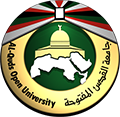About the Program
The Department of Accounting in English Language is one of the main and leading departments at the Faculty of Administrative and Economic Sciences. It aims to provide students with a variety of knowledge and skills in order to connect with the local, regional, and global business environment and to deal with accounting systems that adhere to the English language in accordance with the most recent computerized courses and applications, it strives to equip students with a diversity of knowledge and abilities. Because of this, the English language was chosen as the basis for teaching this specialization in order to provide the best knowledge that links accounting, financial, and economic concepts with business facts in businesses, banks, financial markets, and insurance companies, so that graduates in this specialization can get jobs in a variety of governmental and private economic activity sectors.
Accounting specialization in English aims to prepare and qualify specialized national cadres of accountants in order to meet the growing demand for accountants in the public and private sectors. It also aims to prepare students for postgraduate studies or to obtain a specialized professional certificate such as the CPA, CMA, or CFA.
- Defining the Accounting principles used in the preparation of financial reports, with a focus on the importance of accounting in assisting management in planning, controlling, and making decisions.
- Defining generally accepted accounting principles GAAP, for preparing financial statements.
- Preparing a cost accounting with studying and analyzing the cost elements in order to determine the unit cost of the final product “good or service” and evaluate the commodity inventory and use the cost data in planning, control, and decision-making.
- Designing and operating accounting information systems for both manual and automated operation of data.
- Applying the principles of tax accounting and the procedures followed in the Income Tax Department, and studying the tax system and its applications.
- Distinguish between the government accounting system and the accounting system applied in the business sector.
- Presentation of financial information and how to express it in the form of reports written in a specialized, scientific manner characterized by objectivity, accuracy and clarity.
- Reading and interpreting the published financial statements with the aim of deriving useful financial indicators that serve businessmen in the process of making financial decisions in investment and financing.
- Studying accounting in commercial banks and insurance companies, accounting for oil companies and private establishments, in addition to accounting in agricultural companies, and accounting for branches and departments.
- Using accounting information in planning and preparing estimated budgets and methods of performance evaluation and control.
- Using electronic calculators in various fields of accounting.
- Dealing with accounting systems in English language.
- Studying the auditing of accounts in the public and private sectors according to generally accepted international auditing standards.
- Interaction with the public and private sectors, to continue improving university accounting programs in order to narrow the gap between the theoretical and practical aspects.


